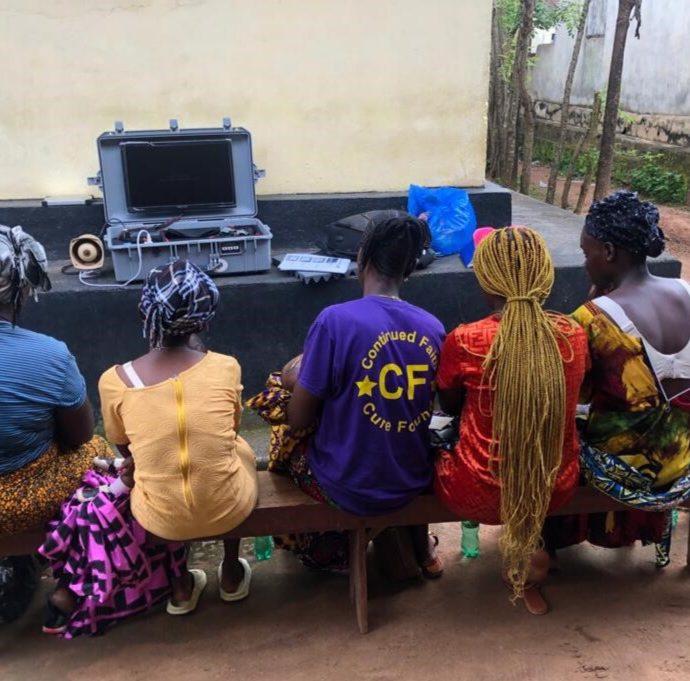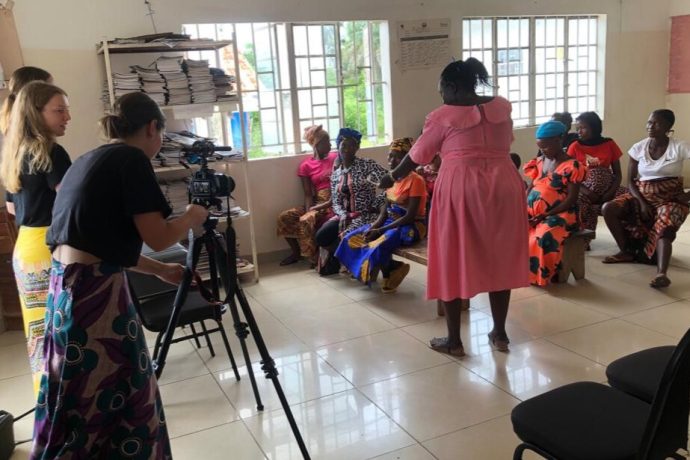

I think that the beauty of our work is that our students have the unique opportunity to engage in community-engaged research using a humanistic lens that foregrounds the voices of the women and healthcare workers in Sierra Leone.

Undergraduate academic programs integrating the humanities, social sciences, and sciences are increasingly common. University-based social impact projects represent another opportunity to bridge disciplines and in so doing, make a difference. At Lehigh University, a project focused on maternal health in Sierra Leone, one of many Global Social Impact Fellowship projects supported by the office of Creative Inquiry, provides a case study in interdisciplinary innovation.
A documentary film initiative created in 2019, Mothers of Sierra Leone is the brainchild of two faculty mentors, Michael Kramp and Fathima Wakeel, who work with a wide range of students across the campus. Each brings a different background to the project: Kramp is a scholar of nineteenth-century British literature and a filmmaker in the Department of English; Wakeel is a scholar of maternal and child health in the Department of Community and Population Health. As they explain in an essay in the LA Review of Books, the short films are designed to highlight “pragmatic solutions” aimed at improving maternal health outcomes in Sierra Leone, a country with the world’s highest rate of maternal mortality. “We use storytelling to improve healthcare,” Kramp explains.
Collaboration is at the heart of the team’s approach. The films feature women and healthcare workers from Sierra Leone and are used in clinics to provide information, amplify women’s voices, and recruit potential healthcare workers. The project’s work includes making the films and conducting qualitative (i.e., through focus groups) and quantitative (i.e., through surveys) research regarding the efficacy of the films in improving maternal health-seeking behaviors made possible by research collaborators in Sierra Leone. Several partners based in Sierra Leone are essential for the project, and the team measures its success against the goal of improving maternal health outcomes.


I think that the beauty of our work is that our students have the unique opportunity to engage in community-engaged research using a humanistic lens that foregrounds the voices of the women and healthcare workers in Sierra Leone.
Kramp has been “consistently impressed” by what the students learn to do: camera work, editing audio and film, qualitative and quantitative research, thinking on their feet, and adapting to changing circumstances. While students have to learn technical skills, Kramp believes that they develop other, more durable skills and mindsets. Take listening, for example. In Sierra Leone, the research team spends a lot of time “sitting in clinics and waiting, watching, and listening.” Students are learning how to think about their audience, a challenging struggle that requires them to acknowledge and appreciate cultural differences. It is a process that requires patience, care, and self-awareness. According to Kramp, “you learn how to listen for things that aren’t being said, and to watch for things that you don’t see right away”—a skill that is taught in the humanities when students learn how to read a text carefully, and one that is crucial for future healthcare and public health professionals. For Kramp, this is part of learning to “think like a humanist.”
“I think that the beauty of our work is that our students have the unique opportunity to engage in community-engaged research using a humanistic lens that foregrounds the voices of the women and healthcare workers in Sierra Leone,” Wakeel says.
Kramp admits that this kind of interdisciplinary, impact-based work is quite difficult, both on a personal and an institutional level. But he sees multiple benefits and beneficiaries. For one, he has the opportunity to work with students in non-humanities fields, many of them on their way to medical school, public health programs, or research labs. The project reintroduces them to the value of humanities training and mindsets.
“Through working on this project I have learned the value of incorporating storytelling into public health research,” says Hannah Falatko, a major in Population Health and minor in Maternal and Child Health in Lehigh’s College of Health. “It fills in many of the research gaps that can’t be explained by simply looking at numbers and helps me view health more holistically.”
What Mothers of Sierra Leone demonstrates is that even when students may not have all the necessary skills at the beginning of a project, they can learn by collaborating. When they are supported and mentored, they can contribute to interdisciplinary initiatives that have real-world impact and that change lives.
To view one of their films (“The Role of the Father,” created by Christina Enodien), please click here.
A community for sharing and uplifting the work of creating more just, humane, and innovative colleges and universities